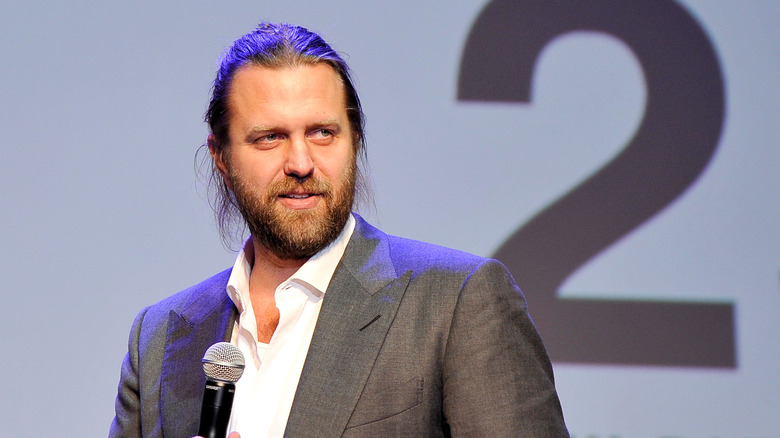Hollywood Director Gambled Netflix's $55 Million TV Series Investment On Crypto
Given Netflix's reputation for canceling shows after just a season or two, you might suspect that the streamer is pretty tight with the purse strings. But then you look at the case of Carl Rinsch, director of 2013's "47 Ronin," and that theory starts to sound a lot less convincing.
If you don't recognize Rinsch's name, that's probably because the aforementioned Keanu Reeves action flick is his only feature film credit to date as director. Despite that — and despite the fact that "47 Ronin" garnered terrible reviews and bombed at the box office — Rinsch received significant studio attention when shopping a new sci-fi streaming series in 2018. Now, an extensive story published by The New York Times details how a pricey deal with Netflix turned into a mess of a production with zero episodes completed.
Per the Times report, Netflix spent more than $55 million on the unfinished series "Conquest," which would have followed artificial humans in a near-future setting. The plan was atypical: a 13-episode season totaling just 120 minutes, resulting in short installments with big visual flair. The project ended up being an incomplete but egregiously expensive disaster. The Times report details how Rinsch used much of the money allocated by Netflix for personal pursuits, including risky stock market speculations, cryptocurrency transactions, and the purchase of a "fleet of Rolls-Royces." It also describes erratic behavior from the director, ranging from untenable onset conditions and angry outbursts to claims that he could "predict lightning strikes and volcanic eruptions." As of now, Rinsch is currently in arbitration with Netflix, claiming that he is due further payments under their contract. The streamer contends that such payments were dependent on production goals that were never met.
The curious case of Carl Rinsch
Since Carl Rinsch hasn't directed any major films or TV shows since 2013, it's somewhat surprising that he was able to land such a lucrative Netflix deal. According to the New York Times report, Rinsch and his then-wife, Uruguayan model and fashion designer Gabriela Rosés Bentancor, started work on "Conquest," then known as "White Horse," with their own money. They later acquired more funding from production company 30West and from Keanu Reeves himself, who had apparently become friends with Rinsch on the set of "47 Ronin." Still, in order to keep costs low, Rinsch filmed internationally in places where union rules were weaker. This reportedly led to dangerous working conditions, with the Times citing 24-hour filming days and one instance where an actress contracted hypothermia while filming "barelegged in the snow."
Despite all those red flags (Reeves' money in particular was necessary to complete production after a series of delays), many streaming platforms bid big on the project after seeing what Rinsch had already filmed. Netflix won out and awarded the director not only cash but a rare level of creative autonomy as well.
Then, things started to get worse. More complaints of unprofessional on-set conduct came out. Production milestones kept getting missed. Rinsch insisted he needed more money from Netflix and received another $11 million. But as revealed in court documents after his wife filed for divorce, he quickly transferred $10.5 million of that into a personal brokerage account, which didn't exactly go well.
Dogecoin and a fleet of Rolls-Royces
Per the Times, Rinsch made a series of high-risk stock market moves with the money acquired from Netflix, resulting in a loss of nearly $6 million in a few weeks. Additional documents in his divorce case with Gabriela Rosés Bentancor detailed increasingly strange behavior after the start of the COVID-19 pandemic. She claims that he told her at one point that he could tell when lightning strikes and volcanic eruptions would occur. In an email to Netflix executive Rochelle Gerson, Rinsch claimed that he was investigating "the coronavirus signal emanating from within the earth."
Despite his stock market losses, Rinsch reportedly continued to use Netflix's money for personal investments. He bought millions of dollars worth of the cryptocurrency Dogecoin and turned it into a notable profit, only to spend a vast amount of that return on "five Rolls-Royces, a Ferrari, a $387,630 Vacheron Constantin watch and millions of dollars' worth of high-end furniture and designer clothing," according to the Times. Risnch later claimed that many of the items were necessary props for the show.
When "Conquest" was first commissioned as a Netflix original series, every streaming platform was at war for hot, original content. Betting big on a promising idea might not have seemed like such a crazy business move, even from an unproven director. Still, the end result speaks for itself. At this time, Rinsch's legal arbitration with Netflix is ongoing.


